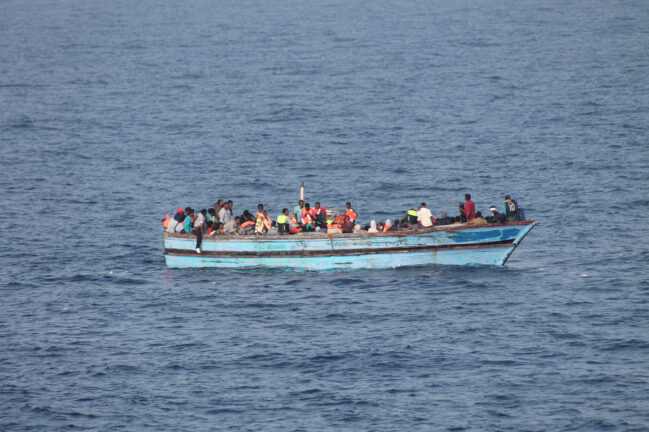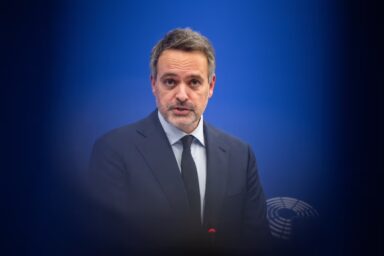In 2025, Libya confirms its controversial role as a migrants’ crossroads in the Central Mediterranean and as Europe’s invisible border. Among sea rescues, accusations of complicity in human rights violations, and regional alliances, the European agency Frontex once again finds itself in the spotlight. The real frontier is that between security and humanitarian responsibility.
In the first half of 2025, irregular migration flows to Europe decreased overall by 20 percent compared to the same period of 2024. However, that is not the case of the Central Mediterranean route. On the contrary, this route that mainly starts from Libya saw a 7 percent increase, with over 22,700 arrivals in the first five months of the year.
The European Border and Coast Guard Agency (Frontex), equipped with high-tech surveillance aircraft and drones, continues to monitor departures from the Libyan coast. Frontex also communicates with Libyan authorities that are frequently criticized for brutal methods used during sea interceptions.
This communication became recently a major sticking point. Front-LEX and Libyan activists in exile accused Frontex of knowingly contributing to the pushback of migrants to places where they risk torture, arbitrary detention, and systematic violence. The complaint explicitly speaks of “complicity in crimes against humanity.”
You might be interested
Save lives or respect the international law?
Amid this scenario, rescue operations remain the most visible and ambivalent image of Frontex. On 1 August, two European planes spotted a boat in distress off the coast of Libya. The rubber dinghy capsized before help arrived, but Frontex operators managed to rescue 96 people. However, two migrants (minors) didn’t survive. Just weeks earlier, a similar tragedy involved two children aged three and four, who drowned. Frontex had reported the boat in distress, but the Maltese rescue arrived too late.
I don’t want people to be sent back to Libya. – Hans Leijtens, Frontex Executive Director
In April, Frontex Executive Director Hans Leijtens made a much-discussed statement. “I don’t want people to be sent back to Libya,” he told media. But he also added that not reporting a boat’s location to the Libyan Coast Guard would mean letting it sink. Words that well summarize the agency’s operational dilemma: saving lives or respecting the limits imposed by international law?
Tensions between Frontex and humanitarian organizations reached its peak in July 2025. The EU Court rejected a transparency request filed by Sea-Watch concerning alleged illegal interceptions by Libyan forces with Frontex’s support. Frontex demanded over €11,000 in legal fees from the NGO – something that many activists called an institutional attempt of intimidation.
Diplomacy wrecked: EU non grata in Benghazi
In July 2025, another event dealt a serious blow to Europe’s credibility on the Libyan front. A high-profile EU delegation made up of Commissioner for Internal Affairs and Migration Magnus Brunner and the interior ministers of Italy, Greece, and Malta, was expelled upon arrival at Benghazi airport. Benghazi is the seat of so-called Government of National Stability (rival body to the internationally recognized Libyan Government headquartered in Tripoli) that in theory controls Eastern Libya. In reality, however, the Libyan National Army and its commander Khalifa Haftar hold the control.
According to local sources, the European delegation did not obtain the required authorizations for entry after first visiting Tripoli. The Benghazi government called it a violation of its sovereignty and ordered the immediate return of the mission, declaring the delegates “persona non grata.” Thus, the attempt to open a dialogue with Eastern Libyan authorities ended in an unprecedented diplomatic incident.
The failed mission had immediate repercussions. Greece temporarily suspended the assessment of asylum requests from people coming from Libya, further straining relations between Brussels and frontline countries. Moreover, the episode exposed the fragility of the EU’s strategy: treating Libya as a single interlocutor is now more than ever a diplomatic illusion.
A geopolitical paradox
Libya remains a geopolitical paradox: a country of migrants’ departure and a sort of an open-air prison, a necessary partner, and systemic human rights violator. Frontex, between radar scans and diplomatic relations, continues to be the controversial face of Europe’s border control.

In the end of July, the EU launched an investigation into a series of unusual flights between Minsk and Benghazi, operated by Belarusian airline Belavia. Brussels suspects these routes may be part of implicit coordination with the authorities in Eastern Libya. The frequency and timing of the flights raised suspicions of a deliberate facilitation of irregular migration flows to Europe, potentially orchestrated for political pressure. It could be a déjà vu of the “hybrid warfare” strategies used by Minsk in 2021.
Meanwhile, Libya has intensified its relations with Europe through trilateral summits with Italy and Turkey. Under new cooperation initiatives with Greece, training programs for the Libyan Coast Guard are underway with the aim of stopping departures.
For many observers, however, all this is merely a new form of border externalization that pushes the problem away without solving it.











